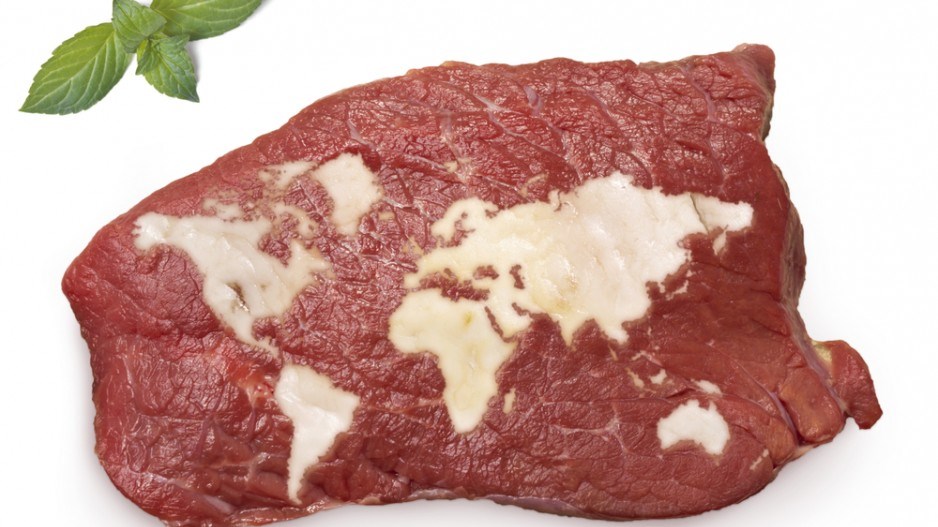By Peter Ladner
As the world struggles to shift its focus on Paris from the tragedies of terrorism to the tragedies of climate change, there’s a climate change trigger lurking in most of our daily lives that will most likely stay in stealth mode at the COP21 talks in early December. I’m thinking of meat – red meat in particular.
Meat’s well-documented connection to bowel cancer and heart disease got an injection of publicity last month with the release of the World Health Organization’s claim that processed meats “cause” cancer. The new study was assessed by a Cambridge risk professor in the Guardian as meaning that seven out of 100 people in the U.K. – up from six out of 100 today – would get bowel cancer if they ate an extra 50 grams of bacon a day.
An online commenter probably summed up the popular response: “Rather a shorter, happier life with bacon than a longer, more miserable one without!”
OK, shrug that one off, but when it comes to climate change, there’s a lot less wiggle room. Meat production, especially red meat production, is a major contributor to greenhouse gas emissions (GHGs).
The exact percentage of human-caused GHGs coming from meat is widely disputed – and complicated. A recent Food and Agriculture Organization of the UN (FAO) report pegged it at 14.5%. Others say 20%. The infamous Cowspiracy documentary erroneously said it was 51%. Whatever the correct number is, the National Geographic concluded that “if meat were dropped from diets globally, the reduction in carbon dioxide emissions would almost equal total U.S. annual emissions.”
“The bottom line is it’s a lot,” said Eleanor Boyle, the Vancouver-based author of High Steaks: Why and How to Eat Less Meat. “You simply can’t talk about food production and climate change without talking about meat production and consumption.”
Even just looking at energy, it takes the equivalent of a gallon of gasoline to produce a pound of grain-fed beef in the U.S. And livestock production emits not just carbon dioxide but about five times more nitrous oxide and methane, the latter being some 23 times more potent for global warming than CO2. Cows are far worse than pigs and poultry. Those gases come from deforestation, fossil fuel inputs for feed, soil tilling, transportation and, yes, belching and farting.
While those numbers hang ominously in the air, the world’s per capita meat consumption keeps going up, as the three-quarters of the world’s population that couldn’t afford meat gets rich enough to eat it.
Climate change isn’t the only reason meat should be coming off the menu – at least as a daily main course. Raising animals for food is a driving force behind deforestation, soil erosion, water pollution, biodiversity loss, marine dead zones, the spread of disease and fresh water scarcity.
Author John Robbins estimates that you could save more water by not eating a pound of beef than by not showering for six months.
And feeding 70% of our grains to livestock that deliver only about 10% of the calories that would be available if we were to eat those grains directly is a hugely inefficient way to feed people. It’s like heating your home and leaving all the doors and windows open.
While we wait for our leaders to work through climate change challenges in Paris, the biggest single act we could take as individuals would not be abandoning our cars, but eating less meat. It’s been said that a vegetarian driving a Hummer has a lower ecological footprint than a cyclist who eats meat.
Heavy meat eating is as dangerous for our species’ future as heavy oil consumption. But it’s vastly more politically charged.
Peter Ladner ([email protected]) is a co-founder of Business in Vancouver. He is a former Vancouver city councillor and former fellow at the SFU Centre for Dialogue. He is the author of The Urban Food Revolution.
To comment on this story, click here.




